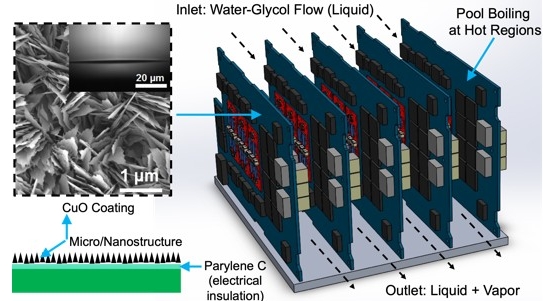New Start-Up Company Arises from POETS-Developed Technologies
Outcome/Accomplishment
A company is pursuing markets in mobile electronics and high-performance computing with cooling technologies developed at the University of Illinois-based Center for Power Optimization of Electro-Thermal System (POETS), an NSF-funded Engineering Research Center (ERC).
Impact/Benefits
A completed exploratory project helped develop technology that can improve the efficiency of heat transfer and cool electronics by immersing them in water. That a startup company has embraced the technology illustrates how POETS' explorations can lead to translational research and commercialization.
Explanation/Background
The technology was born from an exploratory POETS project, Next Generation of Immersion Cooling for Power Electronics. The research required a fundamental understanding of thermal transport, nanomanufacturing methods, and integration schemes to cool electronics by immersing them in water. It involved fundamental research into nanoscale coatings and surfaces along with applied research and testing on wide-band-gap semiconductor devices.
Formed in 2020, AquaQuant Laboratories licensed the POETS-developed technology. The company was founded by a POETS researcher in mechanical engineering and a graduate student in electrical engineering.
Location
Urbana-Champaign, Illinoiswebsite
Start Year
Microelectronics and IT
Microelectronics, Sensing, and IT
Lead Institution
Core Partners
Fact Sheet
Outcome/Accomplishment
A company is pursuing markets in mobile electronics and high-performance computing with cooling technologies developed at the University of Illinois-based Center for Power Optimization of Electro-Thermal System (POETS), an NSF-funded Engineering Research Center (ERC).
Location
Urbana-Champaign, Illinoiswebsite
Start Year
Microelectronics and IT
Microelectronics, Sensing, and IT
Lead Institution
Core Partners
Fact Sheet
Impact/benefits
A completed exploratory project helped develop technology that can improve the efficiency of heat transfer and cool electronics by immersing them in water. That a startup company has embraced the technology illustrates how POETS' explorations can lead to translational research and commercialization.
Explanation/Background
The technology was born from an exploratory POETS project, Next Generation of Immersion Cooling for Power Electronics. The research required a fundamental understanding of thermal transport, nanomanufacturing methods, and integration schemes to cool electronics by immersing them in water. It involved fundamental research into nanoscale coatings and surfaces along with applied research and testing on wide-band-gap semiconductor devices.
Formed in 2020, AquaQuant Laboratories licensed the POETS-developed technology. The company was founded by a POETS researcher in mechanical engineering and a graduate student in electrical engineering.

